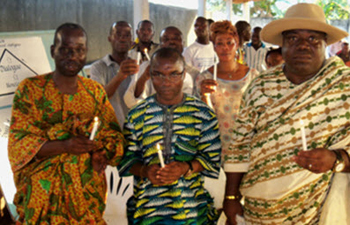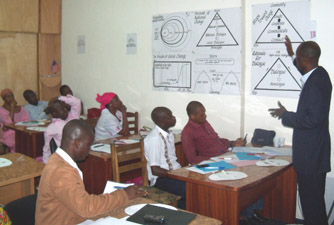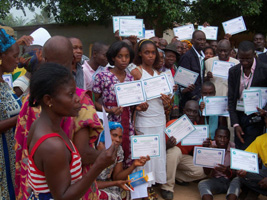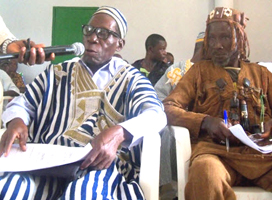Building community cohesion in the Ivory Coast
Distressed by post-election violence and North-South ethnic tribalism, James Offuh created United for Peace Against Conflict International (UFPACI) in January 2012 to build community cohesion and respect for cultural differences. UFPACI contributes to peacebuilding activities, teaching about the causes and consequences of conflict and proposing practical transformative measures in order to enhance the adoption of a culture of peace and non-violence.
Dialogue in Nigeria – Muslims and Christians creating their Future – Model of engagement replicated in the Ivory Coast
In May 2012, Offuh discovered the Jewish-Palestinian Living Room Dialogue – California USA, and requested a copy of their 2012 documentary film, “Dialogue in Nigeria – Muslims and Christians creating their Future”. The documentary “gives voices and faces to 200 courageous Muslims and Christians – diverse young women and men – who unite successfully in Jos, central Nigeria.”
The film explores the participants’ experiences:
“Refusing to be enemies, they are together during days and evenings of the 2010 International Conference on Youth and Interfaith Communication. They are tense yet excited to finally cross lines of religion, economics, tribe, and gender to transcend the status quo and discover empathy for each other’s personal life experiences. Together they realize that “an enemy is one whose story we have not heard,” while listening-to-learn and thus dignifying themselves and the ‘others.’ Face to face and in small circles, they begin with ice-breakers and continue in depth to discover one another’s equal humanity – fear, grief, needs, hopes, and concrete plans for a shared future. These determined young Nigerians illustrate how others worldwide can successfully connect and communicate to create authentic community.”
By August 2012, Offuh planned and replicated in Abidjan, Cote d’Ivoire, his first small workshop based upon on Dialogue in Nigeria. Offuh complimented the model for “a new awakened, unprecedented creativity and wisdom needed to build a future that benefits all the public communities within our reach.”
In particular, Offuh referred to:
- 1) Facilitators Guidelines for face-to-face experiences;
- 2) Process of Change described in graphics and text.
In August 2012, young adults gathered from different political, religious and ethnic communities, including Yopougon and Abobo women and men from the Abidjan District. They experienced tools for face-to-face engagement – from safe icebreakers to deeper exploration of one another’s life experiences and humanity – to discover that “an enemy is one whose story we have not heard”.
‘Youth as Artisans of Communication and Peace’ was the vision offered by Mr. Ochee Ogwa, a professional journalist with the Nigerian News Agency’s mission to Cote d’Ivoire.
Dialogue was promoted through a variety of means:
- 1) Perspective Squares – participants realize that others have diverse perceptions and views of life, and there is more than one way – my way – to perceive a situation. People see 16, 17, 18, 40 and other numbers of squares.
- 2) Hand outlines – this introductory ice-breaker helps participants to know one another in a safe way. Two people trace the other’s hand, making them partly overlap. Each person then writes words that describe one’s personal qualities and values. Then they discover what unites them in shared meaning. This allows people to become aware of their uniqueness and also similarities. It helps to overcome judgment and stereotypes. Two diverse participants joined their thumbs with a shared vision of one nation – Cote d’Ivoire. The hand on the left describes his uniqueness: Northerner Senoufo ethnicity. The right hand describes: Southern Attie ethnicity.
- 3) Masks and culture – an art experience to journey inward and discover how one’s culture shapes and influences personal responses to life. This increases self-awareness and closeness to one another by opening a window to oneself and common challenges universally faced in all cultures.
Offuh concluded the session and inspired the diverse youth to continue taking the steps toward change – from monologue to dialogue, from isolation to community for themselves, Cote d’Ivoire, Africa, and humankind.
Step Two – Akoudo Village, Cote d’Ivoire
By 15 November 2012, Step Two in Akoudo Village, Cote d’Ivoire, similarly gathered women, men, and youth of the alienated Ebrie people and Attie people for a day of healing and communication excellence. At the request of UFPACI, police security was deployed by the Ministry of Interior to ensure safety in the Akoudo village.
Kouame N’Guessan Zita, one of UFPACI’s leaders, invited religious communities to cooperate with schools, media, and government institutions to motivate more organized young people to engage in community-based inter-cultural and inter-religious dialogue. Offuh prepared people to tell their Personal Life Narratives while their partners become good listeners, discovering each other’s shared and equal humanity.
The Attie village group came face-to-face with the Ebrie group, narrating their stories for each other, dignifying each other, discovering a new quality of listening-to-learn, experiencing that “an enemy is one whose story we have not heard.”
The Masks and Culture Exercise helps familiarity and trust grow, as Ebrie and Attie leadership and community members – women, men and youth – discover and reveal what masks they wear in public, and how they can become more human and their true, better selves
The Broom Exercise illustrates strength in unity. A strong person was not able to break the broom in bunch. The woman easily broke a singled out broom stick. When we exclude anyone or compete excessively, we are vulnerable and cannot complete important tasks that benefit all. But in unity we are stronger.
A Candle Lighting among the Ebrie people together with the Attie people marked their first time together after many years of inter-community conflicts.
Step Three – March 2013 – 400km to Duekoue
In March 2013, Offuh and a small team from UFPACI drove 400 km from Abidjan to facilitate relationship-building and ethnic, religious, and tribal healing in Duekoue. Offuh mounted graphics charts to illustrate the public peace process, and introduced the context, motives, and principles of the conference.
Offuh called upon the entire community to embrace the practice of dialogue communication as the Guerre ethnic group sat side-by-side with the Mossi-Burkinabe; two ethnic groups who have been in inter-community violence caused by land disputes. Offuh encouraged the youth to become artisans of peaceful communication and credible peace workers.
A candle lighting experience put the day and the participants “in Light.” Offuh extended an invitation, “All participants please come to the light. Today a new light of hope has come into your life, into your community. The darkness of suffering, pains, and loss of hope have come to an end. Now this light ends your gross darkness that covered Duekoue. Today on this ground where the massacre and mass grave were done, as you take this light home the land will receive peace and calmness. Those that lost their lives during the war will now rest in peace because of you.”
Step Four — June 2013 – Confronting Fear: First Dozos-Guerre Reconciliation in Duekoue
In June, 2013, Offuh drove with a small UFPACI team 400 km from Abidjan to facilitate historic relationship-building and ethnic, religious, and tribal healing between the Dozos and Guerre people, deeply divided since brutal 2011 post-election slayings.
The venue was the broadcast center of Radio Voix du Guemon in Duekoue, at the heart of the March 2011 death and destruction, after which no institution, organization, or government agency had even attempted to facilitate reconciliation between the Dozos and their Malinke allies, and the Guerre and other ethnic groups. Most Cote d’Ivoire citizens, including Guerre and Dozos, practice traditional animist culture and religion, while 25% are Muslims and 12% Christians.
The Dozos and Wee-Guerre, traditional adversaries, began slowly with ice-breakers and then serious relationship-building experiences. They continued their deep, face-to-face listening and story-sharing into the mealtime together that brought them closer together.
Then Danisha, a Guerre musical artist, sang about reconciliation and living together while inviting the people to hold hands and decide to succeed together in unity and develop their common home in Duekoue.
For the first time, Wee-Guere and Dozos people held hands and danced joyfully together as one.
A candle lighting ceremony affirmed the successful, concrete step of the courageous Dozos and Guerre participants. Offuh passed light to Dozos and Guerre leaders. “Today I pass on the light of peace, hope, and love to you, just as I have received light from my mentors and life experiences. Today you become a light in the midst of others. Continue to share this light with all Dozos and Guerre around our country – Cote d’Ivoire. Through you, others will hear about this human activity of meeting, communicating, dialogue, and reconciliation. Now go as an ambassador of peace from this day to enrich your community.”
This peacebuilding initiative is a shared endeavour of United for Peace Against Conflict International (UFPACI), a member of the Global Coalition for Conflict Transformation, and the Jewish-Palestinian Living Room Dialogue in California, USA.























RT @gcct_tc: Building community cohesion in the Ivory Coast: Distressed by post-election #violence – IvoryCoasty – http://t.co/CcatnWG3DF
Pingback : The fourth GCCT newsletter | TransConflict
Impressive approach to reducing ethnic, sometimes religious, conflict and hate. @transconflict http://t.co/uSbjcBCnxJ
RT @BillMcGeeney: Impressive approach to reducing ethnic, sometimes religious, conflict and hate. @transconflict http://t.co/uSbjcBCnxJ
RT @BillMcGeeney: Impressive approach to reducing ethnic, sometimes religious, conflict and hate. @transconflict http://t.co/uSbjcBCnxJ